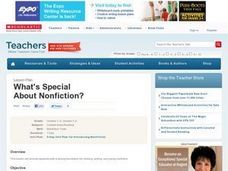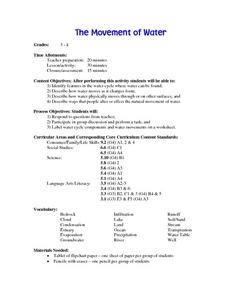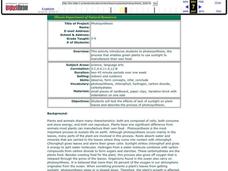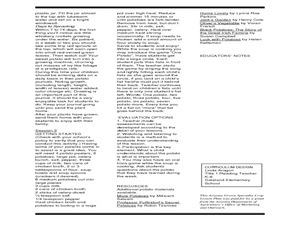Curated OER
What's Special About Nonfiction?
Students examine the difference between nonfiction and fictional writing. They identify the characteristics of nonfiction literature and examine how a nonfiction textbook organizes information.
Curated OER
The Movement of Water
Here is an excellent lesson plan on the water cycle and the states in which water exists. Learners identify the features of the water cycle, describe how water changes form, and look at ways that people affect the natural movement of...
Curated OER
Animals and Plants of BC's Rocky Shore: lesson 3
Young scholars create a mural of the food chain of the animals and plants of BC's rocky shore. In this food chain lesson plan, students also play a food chain matching game.
Curated OER
Human Anatomy- How Do We Move?
Students examine the muscular system. In this muscular system lesson, students first draw a realistic representation of their leg or arm bones. Students do several activities to attach these bones to "joints" with string to simulate...
Curated OER
Dissecting Owl Pellets
Young scholars dissect owl pellets. In this dissecting owl pellets lesson, students discuss birds of prey and make predictions about what they may find during the investigation. Young scholars tease out skull and bones and try to make a...
Curated OER
Pacific Salmon and Mountain Pine Beetle
Students compare fish anatomy. In this teacher demonstrated dissection lesson, students compare fish anatomy to that of humans. They explore different fish and their unique properties. There are 4 distinct activities which can be...
Curated OER
The Skeletal System
Students research the skeletal system. In this anatomy lesson, students measure their bodies to find the approximate length of their bones. They draw and cut out each of the bones and then attach them using brads or glue.
Curated OER
Photosynthesis
Students are introduced to the process of photosynthesis. In groups, they test the effects of the lack of sunlight on plant leaves and compare the results with their hypothesis. They note the characteristics that plants and animals share...
Curated OER
Insects Around Us
Pupils fill out worksheets about insects and how they are helpful to our world. In this insects lesson plan, students learn about flower parts and insects that pollinate them.
Curated OER
Minerals
Students define the characteristics of a mineral. In this geology activity, students are given out various materials to observe such as a chicken bone, salt shaker, white paint, and chalk. Students categorize the items and are told what...
Curated OER
Conservation in Costa Rica
Students brainstorm what they do that requires land use and use a worksheet to calculate their footprint (the total area of land and water required to produce all the resources they consume). They then compare their footprints to each...
Curated OER
It's The States of Matter
Students investigate the properties of solids, liquids and gases. In this states of matter lesson plan, students observe dry ice and its characteristics. They calculate the density of dry ice and observe the sublimation of the dry ice...
Curated OER
From Mashed to Riches
Students discuss the uses of a potato. For this food group lesson, students identify the five food groups and which one the potato belongs to. They create potato printing, compare different kinds of potatoes, grow a potato plant, and more.
Curated OER
Let's Talk About Painting
Discuss art and read Matthew's Dream. For this visual arts lesson, students recognize that there are different styles of art, each with its own techniques. Use simple techniques to understand art and work at stations to...
Curated OER
Rules for Rubrics
How do you create an effective and fair rubric? Read this article to create the best rubric possible.
Curated OER
Feeding Frenzy
Young biologists take a look at the myriad of ways that animals increase their chances of surviving in the wild. The adaptations help animals hide, hunt, and attract a mate. This activity specifically explores how insect mouth parts are...
Curated OER
Investigate Science Using Crayfish
Young scientists discover the importance of scientific investigation by observing live crayfish. They carefully observe the patterns of crayfish in different environments. Then they discuss their conclusions and define what all living...
Curated OER
Reading Primary Source Documents: Historical Content
Why do we read primary source documents? What can they give us that other writings cannot? Provide your learners with any of the primary sources attached here (there are seven), and have them complete the graphic organizer (which opens...
US Citizenship and Immigration Services
Thanksgiving 2—The Pilgrim Story and My Immigrant Story
The tradition of the First Thanksgiving is really a story of immigration. Connect the feelings and customs of the early Pilgrims to the experiences of the immigrants in your class with an introduction to the 13 colonies, the Mayflower,...
Curated OER
Google Earth Geology Field Trip
Students take a virtual field trip around California using Google Earth. For this geology field trip lesson, students explore landforms and a variety of rocks located in California. Students compare environments where rocks are...
Curated OER
Lesson Plan for Cricket's Supper
Interested in a special folktale to read with your class? Then this lesson might be for you. Readers will build an understanding of the food chain while creating a storyboard that includes the characters, setting, and plot of the story....
Sargent Art
Destination Art: Paper Mola Collage
The Kuna Indians hail from the San Blas Island near Panama. Learners will investigate their culture by creating paper mola collages, just like the ones created by the indigenous Panamanians. They'll focus on understanding the symbolism...
Sargent Art
Kandinsky - Inspired by Music
Who is Wassily Kandinsky? Introduce your young artists to the wonders of abstract nonobjective art through music. They'll listen to music as they cut, paste, and paint emotional works of art. The activity suggests the use of soothing...
Curated OER
The Giving Tree
Little literature analysts listen as you read The Giving Tree to them and discuss other ways the tree could have helped the little boy.A three-column chart is given to each individual showing what the tree and boy gave to each...

























